T. Belman. A blow by blow account of the events surrounding the release of the Trump Plan in January and the changing landscape. At first the settler leaders were told that Trump would support annexation within 48 hours. Unfortunately one of the settler leaders put out a press release, even though they had been told not to divulge anything for 48 hours. The press release angered the Saudis who figuratively stormed the Whitehouse.
As a result, the next day the expected annexation hit an obstacle. The Trump team announced that the annexation was subsject to completing a “mapping process” that would take time. I argued at the time that it was a stall because there was no need for mapping. Afterall the Whitehouse and Israel had long agreed on the boundaries of the settlements so no mapping was necessary.
Israeli mayors flew to DC for Trump plan rollout, believing US would back sovereignty within days, but 1 of them says colleague’s press release blasting proposal changed everything.
By JACOB MAGID, TOI
EFRAT, West Bank — It was Thursday afternoon, January 23, just six weeks before Israel’s third consecutive election, and a visiting US Vice President Mike Pence had just invited Prime Minister Benjamin Netanyahu and then-rival Benny Gantz to the White House the following week to discuss “prospects for peace here in the Holy Land” with President Donald Trump.
Hours later, a senior Israeli official briefed a number of reporters on the upcoming trip, saying it would feature the unveiling of the White House’s long-awaited “Vision for Peace.” Divulging some of the details of the up-until-then largely un-leaked plan, the senior official said it would allow for Israeli annexation of all West Bank settlements as well as the Jordan Valley with what is left beyond the Green Line to be transformed into a Palestinian state.
But there was more, the Israeli official gushed, clearly ecstatic to not be discussing another US peace proposal that required Israel to relinquish control over the Jordan Valley, East Jerusalem and many of its West Bank settlements.
“If the Palestinians immediately reject the plan, the US will be prepared to accept the enactment of Israeli sovereignty over [parts of the West Bank] within 48 hours,” the official said, according to two sources familiar with the conversation.
Getting wind of the same message and comprehending the historic magnitude of what was slated to take place the following week, five settler leaders asked for and were granted on Sunday afternoon, January 26, an invitation to join Netanyahu in Washington. Hours later, they were on a plane to DC.

US Vice President Mike Pence hosts PM Netanyahu at the US Embassy in Jerusalem, January 23, 2020. The meeting was also attended by Israeli Ambassador to the US Ron Dermer, second from left, and US Ambassador to Israel David Friedman, second from right (Kobi Gideon/GPO)<
>
<
>
Fast forward just three days, to Wednesday, January 29, and the West Bank mayors were on their way back to Israel. The brief feeling of euphoria that climaxed in DC around Trump’s unveiling of the plan a day earlier had quickly dissipated, as the newly solidifying position in the White House became one that conditioned support for Israeli annexation on the completion of a bilateral mapping committee’s work to define exact parameters for the move — a process that would not take days, but months.
What caused the sudden decline in American eagerness to back annexation?
A settler leader who made the trip to Washington points to a press release issued by one of his colleagues in the early hours of Tuesday morning that blasted the vision the president would unveil hours later.
That statement, Efrat Mayor Oded Revivi said, had Trump and his advisers wide awake and fuming, with White House officials telling the settler leaders they “were lucky [they] weren’t being kicked out of the country.”
Revivi explained how the press release caused a domino effect that prompted officials in the Gulf states — whose support would be crucial for the peace plan’s success — to process just how quickly Jerusalem and Washington were hoping to move on annexation. The ensuing pressure they applied on the Trump administration to slow down the pace led to the introduction of the “mapping committee” concept and talk of “months” rather than “days” when it came to US backing for Israeli annexation.
The other settler leaders who joined Revivi in DC do not subscribe to his theory, and argue that the Efrat mayor has placed far too much weight behind the statement of one West Bank mayor. But Revivi insists that the press release put out by his colleague caused significant damage and that Trump, White House Senior Adviser Jared Kushner and US Ambassador David Friedman were up in the pre-dawn hours irate about it for good reason.
During a lengthy interview in his office at the Efrat municipality building, Revivi recalled some of the most dramatic moments on his trip to DC four months ago, which he now views as a “missed opportunity.” And, unlike with previous letdowns on the journey toward annexation of their communities, Revivi argued that this time, the settler leaders have no one else to blame but themselves.

Efrat mayor Oded Revivi speaks during a press conference in Efrat on July 31, 2019. (Gershon Elinson/Flash90)<
>
<
>
You can’t sit with us
“Everything happened really quickly,” Revivi said, thinking back to the days after Pence extended his White House invitation.
The Efrat mayor was the first of the settler leaders to reach out to the Prime Minister’s Office on the Saturday night after Pence extended his invitation to suggest that he make the trip to Washington as well.
Having briefed one of the plan’s architects, Jason Greenblatt, during his first visit to Israel as Trump’s peace envoy and having maintained an ongoing dialogue with the senior administration official since, Revivi thought his presence in Washington might come of use to the premier.
Revivi also wears a second hat, as foreign envoy of the Yesha umbrella council of Israeli mayors in the West Bank. In that capacity, he interacts regularly with the same international press that would be hounding Netanyahu’s delegation, eager for information on his meetings with the president, and that consequently he would have an opportunity to broadcast the settler narrative, which in recent years has become more and more synonymous with the official Israeli one.
By Sunday, other members of the Yesha Council also became interested in tagging along, and a decision was made by the umbrella body to send three additional West Bank mayors: Yesha Council chairman and Jordan Valley Regional Council chairman David Elhayani, Binyamin Regional Council chairman Yisrael Gantz and Gush Etzion Regional Council chairman Shlomo Ne’eman. The idea was to dispatch a delegation to DC with a diversity of views on the matter, with the additional three members serving as somewhat of a counter to the more politically moderate Revivi.
The four of them took off for the US that evening, arrived on Monday morning and already by 2 p.m. had a meeting with Netanyahu at the Blair House where he was staying.

Prime Minister Benjamin Netanyahu meets with Yesha Council leaders at the Prime Minister’s Office in Jerusalem on September 27, 2017. (Amos Ben Gershom/GPO)<
>
<
>
“This was definitely a sign that our presence in DC was welcome and appreciated by the prime minister in that he found time to sit with us, hours before meeting with the president,” Revivi said.
Shortly before the sit-down, Elhayani received a call from the PMO asking if it would be alright if Samaria Regional Council chairman Yossi Dagan joined the meeting as well.
Dagan had also made the trip to DC, but chose not to do so as part of the Yesha Council delegation, which he has long refrained from cooperating with. His confidants have argued that the umbrella body is ineffective and often unwilling to criticize right-wing governments, while his critics in the council say he prefers to avoid having to share the spotlight.
Elhayani, who had long fallen in the second category, told the PMO that it would be inappropriate for Dagan to attend the meeting given that the Samaria Council chairman had been speaking publicly against the plan and Netanyahu’s willingness to entertain it in recent days.
The Yesha Council chairman’s opinion was respected, and the meeting was held without Dagan.

Samaria Regional Council chairman Yossi Dagan (L) meets with Prime Minister Benjamin Netanyahu in the Blair House on January 27, 2020. (Samaria Regional Council)<
>
<
>
While Netanyahu divulged little during the gathering, saying he had promised the Trump administration not to reveal details of the plan before it would be released the next day, the premier assured the settler leaders that the announcement would be “historic” and that they would be “surprised for the better” — phrases that further strengthened the view the mayors began comprehending in DC that the long-awaited application of Israeli sovereignty to their communities was just days away, Revivi said.
With the media waiting outside the Blair House, the settler leaders asked to stay longer to put together a coordinated message with the little information they had available to them.
They ended up staying an entire hour, to the point where Revivi said the prime minister’s staff did not realize they were still there. When they finally got up to leave, they noticed Dagan walking into another one of the guest house rooms.
“David [Elhayani] took this personally, and all of the sudden he went from being a supporter of the plan, to being a major opponent,” Revivi recalled.
As he walked out of the Blair House and through Lafayette Park, said Revivi, who was alongside him, Elhayani began phoning “everyone he knew in the prime minister’s circle to relay how upset he was, how he felt like he had been stabbed in the back and how he would now come out against the plan as a result.”
So riled up was Elhayani that he didn’t notice the park was full of press and that a TV crew had been following as the settler leader shouted his intention to torpedo the Trump plan into the phone. Luckily, for him, the crew was a private video team filming a documentary for a local Evangelical Christian community and was not looking to break news on the latest settler-government divide.
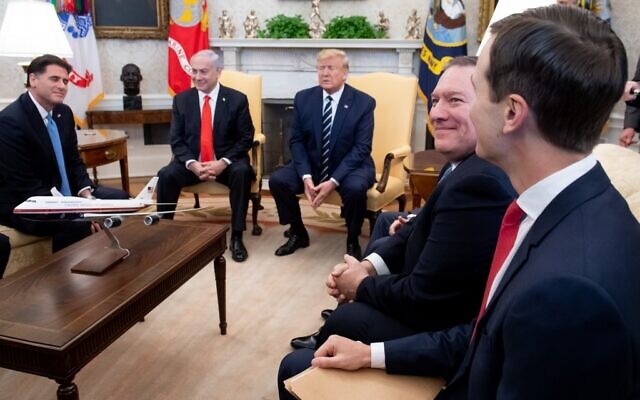
US President Donald Trump meets with Prime Minister Benjamin Netanyahu alongside US Vice President Mike Pence (C), US Secretary of State Mike Pompeo (2nd R) and White House adviser Jared Kushner (R) in the Oval Office of the White House in Washington, January 27, 2020. (Saul Loeb/AFP)<
>
<
>
A small request
Later that evening, one of the mayors had organized an “off protocol” briefing with an American official who would provide the settler leaders with additional details on the plan.
The official didn’t reveal too much new information, but did make clear, Revivi said, that if the Palestinians were to immediately reject the plan — which would include a long list of conditions that, if met, would allow for the creation of a Palestinian state — Israel would be allowed to move forward with annexation 48 hours later, with Washington’s blessing.
The American official had just one request for the four mayors, Revivi recalled: “If you end up liking the plan that you hear tomorrow, we have no problem with you coming out and supporting it. But if you’re against it, we ask that you keep quiet for the next 48 hours.”
For some in the room, the ask was substantial given the ideological opposition among most settler leaders to the establishment of any Palestinian state, no matter how limited its powers or how non-contiguous it might be.
But Revivi, who said he had no problem offering statehood for a Palestinian leadership willing to accept the long list of conditions put forward by the Trump plan, found the request reasonable.

Efrat Mayor Oded Revivi speaks in his sukkah on during the Jewish holiday of Sukkot in the Efrat settlement, on October 11, 2017. (Yesha Council)<
>
<
>
“We were given information that wasn’t supposed to be public until the day after, and the request, at least to me, seemed like a genuine attempt to try and move things forward,” he explained.
After the meeting, the four mayors headed back to their hotel to try and get some sleep ahead of the plan’s release the next day. But due to a combination of jet-lag and adrenaline, none of them succeeded in doing so.
At around 3 a.m., Revivi said that each of them began getting bombarded with questions from Israeli media asking them why the Yesha Council had declared its opposition to the deal.
Three of the four mayors had no idea what the inquiring reporters were talking about, as they had not put out such a statement.
“After we understood that something had been released without our knowledge, each of us began shouting at various people on the phone, to the point where hotel security came banging on our doors, telling us not just to be quiet, but to leave,” Revivi recalled chuckling.
Eventually, Revivi, Gantz and Ne’eman ended up in Elhayani’s room, where they learned that he had decided to release a statement, on behalf of the Yesha Council, against the plan.
Titled, “A sense of crisis among Yesha’s delegation in Washington,” it stated that the mayors had just left a meeting with an American official and that Elhayani was “disturbed” by what had been conveyed.
“We cannot agree to a plan that will include the establishment of a Palestinian state… even if it means giving up sovereignty in Judea, Samaria and the Jordan Valley,” said Elhayani in an accompanying quote.
He later told The Times of Israel that the statement was released in coordination with the umbrella body’s staff, and after he had spoken to a number of West Bank mayors who weren’t in Washington. Elhayani acknowledged that he did not consult, however, with the three colleagues with whom he had flown to DC.

David Elhayani, mayor of the Jordan Valley Regional Council, speaks to AFP at his office in the West Bank on September 11, 2019. (AHMAD GHARABLI/AFP)<
>
<
>
‘You’re lucky we’re not kicking you out of the country’
By this point, it was 4 a.m. and the settler mayor who had organized the briefing with the American official was getting phone calls relaying how upset the White House was over the press release.
“We are being told that the president is awake and upset, that Jared Kushner is awake and upset, that David Friedman is awake and upset,” Revivi said. “They all wanted to fire the official who briefed us because he failed in his mission.”
The settler leaders hadn’t failed to keep quiet in the 48 hours after the plan was released, as promised; they had issued a statement against the plan before it was even unveiled.
The Efrat mayor speculated that the US president had likely been up in the first place due to the following day’s impeachment hearing in the Senate, but this was only something he considered in hindsight.
At that point, frustration between members of the settler delegation escalated as they were all being pressed to issue a statement in support of a deal, which they had yet to see in full.

US President Donald Trump points to a reporter to ask a question as he speaks about the coronavirus in the James Brady Press Briefing Room of the White House on April 2, 2020, in Washington, as White House adviser Jared Kushner listens. (AP Photo/Alex Brandon)<
>
<
>
In what they thought could help placate those in the administration who were livid over the statement, the mayors passed along an offer to come to the White House and apologize personally.
“Needless to say, it was completely rejected,” Revivi said smiling at the seeming naiveté of his colleagues’ thinking in the moment. “People we were in touch with from the administration were telling us, ‘you’re lucky we’re not kicking you out of the country.”
On Tuesday morning, hours before the unveiling ceremony, Elhayani received a call from Netanyahu, who Revivi said, was equally annoyed to be dealing with such an issue while he was busy with the final arrangements for the White House event as well as his own legal troubles at home: At around the same time the Yesha chairman had released his statement, Netanyahu announced that he was withdrawing his request for parliamentary immunity in the three corruption cases against him.
“Nobody — never mind me — not the prime minister, not the White House, nobody was satisfied with the explanation Elhayani was providing” for why he released the statement, Revivi said, adding that all the Yesha Council chairman would say at the time was that he opposed the plan without elaborating as to why.
Elhayani dismissed this account in an interview this week, saying his statement spoke for itself and that he could not support any plan that included the establishment of a Palestinian state.

(From L-R) Jordan Valley Regional Council chairman David Elhayani, Prime Minister Benjamin Netanyahu and cabinet secretary Tzachi Braverman applaud after the government authorized the legalization of the Mevo’ot Yericho outpost at the weekly cabinet meeting at the Jordan Valley Regional Council, September 15, 2019 (Haim Tzach/GPO)<
>
<
>
After their various attempts to pass along an apology to the administration were rejected, the settler leaders began to discuss whether they should attend the late morning unveiling ceremony.
“We knew this would be an historic event, but at the same time, we didn’t want to be filmed clapping for something we might not end up agreeing with,” Revivi explained.
Ultimately, their decision was made for them, as the White House relayed to the PMO moments before the ceremony started that they would not be extending invitations to the settler leaders.
Yes, no, maybe?
The four mayors ended up watching the ceremony from Elhayani’s hotel room a block away from the White House, and as Revivi put it, nothing they heard gave them reason to protest. “There wasn’t a declaration of an independent Palestinian state for us to object to,” but rather conditions the Palestinians would have to meet in order to enter negotiations for a state, Revivi explained.

US President Donald Trump, right, and Prime Minister Benjamin Netanyahu at a press conference in the East Room of the White House on January 28, 2020, in Washington. (Sarah Silbiger/Getty Images/AFP)<
>
<
>
What they did see was Netanyahu thanking Trump for becoming “the first world leader to recognize Israel’s sovereignty over areas in Judea and Samaria that are vital to our security and central to our heritage.”
Immediately afterwards, they heard Ambassador Friedman tell reporters that Netanyahu could implement the annexation anytime he wished to and “Israel does not have to wait at all.”
When the settler leaders met with the prime minister in the Blair House shortly thereafter, Revivi described “a sense of a party,” as Netanyahu told them he’d bring annexation before the cabinet for a vote the following Sunday.
Nonetheless, having learned the lesson of the commotion caused by Elhayani’s statement hours earlier, the settler leaders refrained from making definitive statements in support of the plan, particularly because parts of it, including the exact border specifications, were left vague.
Regardless, the five mayors flew home Wednesday in good spirits, Revivi said, mainly due to the fact that their long-sought goal would soon be realized.

Prime Minister Benjamin Netanyahu speaks with US President Donald Trump during an event within the East Room of the White House in Washington on January 28, 2020. (AP/Susan Walsh)<
>
<
>
It wasn’t until they landed for a layover in Paris’s Charles de Gaulle Airport that they get wind of a series of interviews Kushner had given, utterly contradicting what Friedman had told reporters a day earlier about the US being ready to back annexation as soon as Israel liked.
The senior White House adviser and chief architect of the plan told CNN that he didn’t think Israel would annex immediately, and Gzero Media that the “hope is that they’ll wait until after the [March 2] election.”
Upon landing in Israel, Revivi recommended that the settler leaders meet again with Netanyahu to receive some clarification as to who was running US policy vis-à-vis annexation: Friedman or Kushner.
On Friday, Netanyahu met with Revivi and a handful of other settler leaders and assured them that he did not intend to go back on his vow to declare sovereignty in the West Bank. However, the premier admitted he needed time to clarify the “confusing” message coming from Washington, the Efrat mayor said.
America first. Settlers second.
Recognizing the shifting tide in DC toward Kushner’s slowed-down approach on annexation, Revivi and other settler leaders began reaching out to their Republican and Evangelical contacts in the US, hoping the White House influencers could convince the administration to change course.
“There had even been talk of boarding a plane back to Washington on Saturday night,” Revivi said.
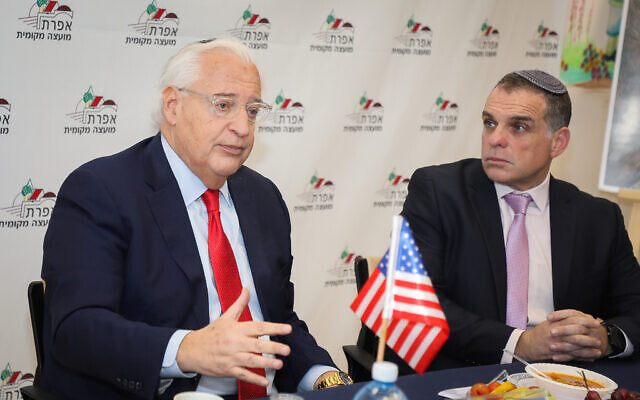
US ambassador to Israel David Friedman (L) with Efrat Mayor Oded Revivi in Efrat on February 20, 2020. (Gershon Elinson/Flash90)<
>
<
>
But after each of the settler leaders spoke to his various leads in the two camps, they realized there was no point in doing so.
“The Republican officials we spoke to said they weren’t interested in picking a fight with the administration, as Trump ‘knows what’s best,’” Revivi lamented.
The answer the West Bank mayors received from Evangelical leaders was even more blunt.
“We really don’t understand what you’re doing. We thought you would have fallen on the floor and kissed Trump’s feet,” the Efrat mayor recalled one Evangelical leader telling him. “Don’t you understand what you’re getting? You’re standing in the way of massive financial deals the US is hoping to ink with the Gulf states, and because of your statements, you’re jeopardizing the notion of America First.”
At this point, Revivi said he understood why the Trump administration had been so enraged by Elhayani’s press release.
Citing his conversations with Trump allies, Revivi explained that, the way he sees it, the administration’s plan was less about some grand desire to promote peace in the region and more about expanding business ties with the Gulf states, who are interested in seeing progress on the Palestinian issue before further developing their relationship with Israel’s biggest ally.

US Treasury Secretary Steven Mnuchin, fifth from left, and Bahrain Crown Prince Salman bin Hamad Al Khalifa, sixth from left, listen to White House senior adviser Jared Kushner, standing, during the opening session of the ‘Peace to Prosperity’ workshop in Manama, Bahrain on June 25, 2019. (Bahrain News Agency via AP)<
>
<
>
The Gulf states, according to Revivi, had been willing to move forward with the US, even if the Palestinians were to reject the plan, but when they got hold of how quickly the Israelis and Americans were planning to move on annexation, they voiced their objection to the Trump administration, leading Kushner to slam the brakes on talk of sovereignty “within days.”
Elhayani’s press statement had been the “trigger” that set off the Gulf states, who felt such an immediate implementation of the peace plan was selling the Palestinians short, Revivi said, again relying on his conversations with Trump allies.
The Efrat mayor recognized that his account places quite a deal of weight behind the statement of one mayor in the Jordan Valley, and assumes that officials in Riyadh, Abu Dhabi and Doha care what David Elhayani says or even know who he is.
“But the fact remains that the statement caused considerable tension in the highest levels of the Trump administration and we were told as much,” Revivi said, standing by his account.
He pointed out that the whole idea for a “joint mapping committee” to determine the exact amount of land Israel would be allowed to annex was only born after the plan was introduced.
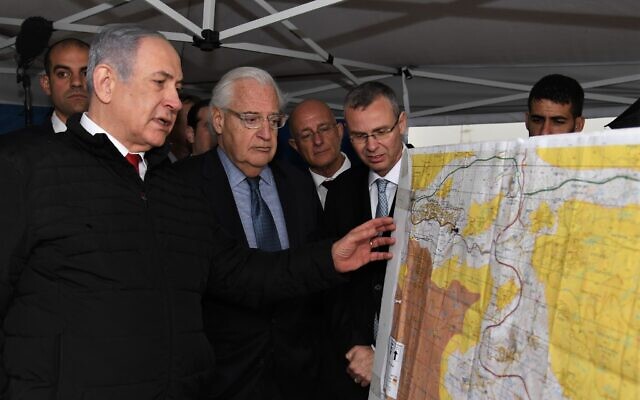
Prime Minister Benjamin Netanyahu, left, US Ambassador to Israel David Friedman, center, and Tourism Minister Yariv Levin during a meeting to discuss mapping extension of Israeli sovereignty to areas of the West Bank, held in the Ariel settlement, February 24, 2020. (David Azagury/US Embassy Jerusalem)<
>
<
>
Moreover, he claimed the committee “is not a serious” body, arguing that none of the members have experience drawing up maps and recognizing which lines are defensible and which are not.
Revivi then returned, in the interview, to the fateful “off-protocol” Monday evening meeting with the US official in Washington, saying that even the settler leaders were puzzled as to why the US wanted to move so quickly on annexation.
“This also had been about America First,” he said, revealing that the American official explained to them that the White House wanted annexation to be advanced quickly enough in Israel for the US to be able to veto the inevitable UN Security Council condemnation against the move; and all quickly enough for the Trump administration to be able to play up the gesture on the campaign trail, ahead of the November presidential election.
Elhayani’s statement, Revivi maintained, caused an ensuing “yellow card” from the Gulf states, thereby scuttling the timeline created by the Trump administration to maximize the benefit of backing such a controversial move.

Prime Minister Benjamin Netanyahu (L) shakes hands with Efrat Mayor Oded Revivi in Efrat on January 28, 2019. (Gershon Elinson/Flash90)<
>
<
>
Giving Elhayani too much credit
To put it mildly, the other members of the Yesha delegation to Washington do not give as much weight to that middle-of-the-night press release.
“I’d be honored if the American administration took me and the Yesha Council that seriously,” Elhayani said, flatly calling Revivi’s assumption a “lie.”
According to the Yesha chairman, the reverse in the White House position on immediate annexation was a result of the meeting Trump held with Benny Gantz — who has backed the Trump plan but opposes its unilateral implementation — the day before the plan’s release, as well as the speech given by Netanyahu at the unveiling ceremony, which barely made any mention of Palestinian statehood.
In a more detailed statement responding to the allegations by Revivi in this article, the Yesha Council said “Revivi’s claims have no grip on reality.”
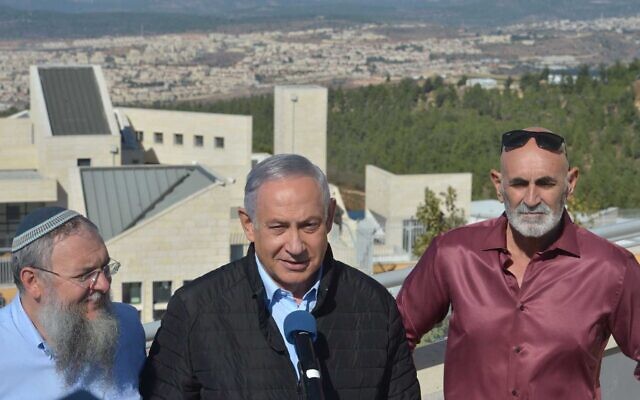
(From L-R) Gush Etzion Regional Council chairman Shlomo Ne’eman, Prime Minister Benjamin Netanyahu and Yesha Council chairman David Elhayani in front of a Gush Etzion lookout point in the West Bank on November 19, 2019. (Haim Zach/GPO)<
>
<
>
“Elhayani, who serves as Jordan Valley Council chairman in addition to being head of the Yesha Council, has a strong interest in supporting a plan that would lead to the application of Israeli sovereignty in the Jordan Valley. Nevertheless, as soon as the details of the plan became clear, he announced that he was prepared to give up sovereignty in the Jordan Valley if that meant establishing a Palestinian state, and he still stands by this assertion.”
“The establishment of such a state [as envisioned by the plan] would mean turning 16 [Israeli isolated] communities [deep in the West Bank] into enclaves and damaging the development of existing settlements,” the statement concluded.
Gantz and Ne’eman similarly rejected Revivi’s account, but drew a different conclusion than Elhayani as to why the US changed its position.
“I’m not sure if [their initial willingness to support immediate annexation] was a trick to get Netanyahu to Washington, but that is a much more likely reason for [the position change] than what [Revivi] is suggesting,” Ne’eman said.
“Trump was in the middle of impeachment hearings and needed this no less than Netanyahu,” another senior Israeli official who made the trip to Washington added, referencing the flashy unveiling ceremony that took place as the Senate was convening its trial. “He got what he wanted, and then Kushner convinced him to dial back the support.”
Both the White House and the PMO declined requests to comment on the record for this report.

US Ambassador to David Friedman (L) speaks with White House Middle East envoy Jason Greenblatt during the opening of an ancient road at the City of David archaeological and tourist site in the Palestinian neighborhood of Silwan in East Jerusalem on June 30, 2019. (Tsafrir Abayov/AFP)<
>
<
>
Permanent delay?
Nearly four months have passed since the plan’s release, and during that time Netanyahu managed to form a government, with Gantz, that will allow the premier to begin advancing annexation on July 1.
While the White House has insisted in recent weeks that a decision to move forward with annexation is Israel’s to make, it has become increasingly vague regarding whether such a unilateral Israeli move is indeed what it would like to see.
Revivi pointed to US Secretary of State Mike Pompeo’s raising of Washington’s concerns regarding Israel’s developing relationship with China, during a whirlwind trip to the Jewish state last week, as proof that the Trump administration’s priorities might be shifting amid the backdrop of the coronavirus pandemic — from pushing for Israeli annexation, to a more aggressive stance against Beijing.
For Revivi, that underlines a fear that disunity among settler leaders, playing out in DC in January, may have profound long-term consequences for their shared cause. “I get the feeling that applying Israeli law in Judea and Samaria may no longer be as urgent. I might be wrong, but if not… this would have been a real missed opportunity,” Revivi said.
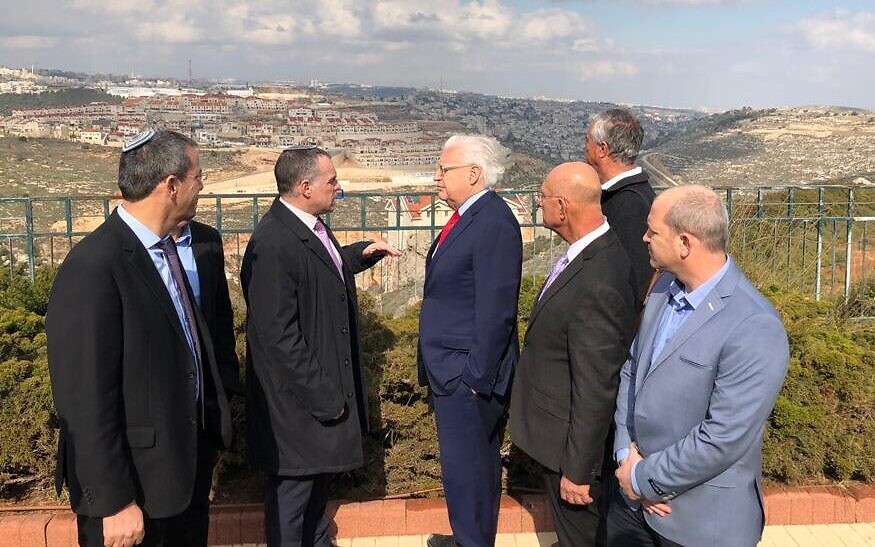
US Ambassador to Israel David Friedman (4th from right) tours the Efrat settlement with settler leaders on February 20, 2020. (Courtesy)<
>
<
>



@ inna1:
The settlers are justifiably upset at the prospect of the creation of “Palestinian” State on 70% of Judea and Samaria with its capital in East Jerusalem (all the Jews who now live in East Jerusalem (over 215,000 people) will have to leave it, by force if necessary).
The Jewish settlements will be locked in among the sea of Arabs with impassable (by the Jews) roads.
The state will share the border with Israel, and there will be a road from the West Bank to Gaza cutting Israel in half which is a HUGE security concern.
The reason the traitor Netanyahu created a left-wing government is to make sure this Arab state is created.
American “permission” is NOT INTERNATIONAL LAW and Israel is NOT A UNITED STATES’ COLONY (at least I hope so).
“Shaked: Alarming sovereignty map”
http://www.israelnationalnews.com/News/News.aspx/280836
Such a disappointment… Unbelievable.
They needed to treat the settlers the same way they treated the PLO. They should have been informed when the public was informed by the plan rollout. No leaks from the partisans on either side, (and they are not equals) just dealing with the government folks who understand when not to speak. Monday morning quarterbacking at its finest LOL. Hope it is not a fatal mistake.
Another blunder of historic dimension by provincial wannabe diplomats ! 53 years of settlement , of investment , of tenacity , of pains vaporized , turned into a pipe dream . The silly behavior of those pseudo-diplomats ( Elhayani – Dagan – Revivi …) , their chest-pounding , glowing with bravado and useless leaks to the medias is beyond stupidity . They wanted to be part of the story and the very second they opened their mouth , the whole muslim world went straight to Trump to ask him : Stop .
Can those slobs be given a punishment for their childish behavior ? Can they be kept out of the rooms of decision makings ? Very elementary discretion is thrown out to the winds by amateur who should stay out of the decision spaces .